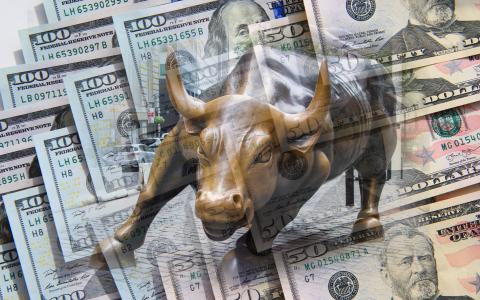
The U.S. economy is not in a recession, contrary to the belief held by many Americans. A recent poll conducted by Harris for The Guardian reveals this significant misconception.
Despite the perception, various economic metrics suggest the economy is thriving. GDP growth has accelerated since the pandemic, outpacing the previous decade's growth rates, and unemployment is near historic lows.
The poll results underscore a disconnect between the economic reality and public perception. For instance, 49% of respondents believe the S&P 500 is down in 2024, while it has actually risen by about 11%, building on a 24% gain from 2023. Additionally, nearly half of those polled think unemployment is at a 50-year high, despite the rate being below 4% for over two years, nearing a 50-year low.
Furthermore, 72% of respondents believe inflation is rising, yet inflation peaked at 9.1% in June 2022 and has since dropped significantly. Despite record employment, rising incomes outpacing inflation, and 401(k) balances reaching new highs, many Americans view the economic situation as dire.
This disconnect seems driven by lingering dissatisfaction with inflation. Although data indicates that inflation has been largely controlled, with prices increasing at a slower rate than during the pandemic, Americans continue to feel the impact of higher costs for groceries, cars, and housing. They desire a return to pre-pandemic price levels, which would require deflation rather than disinflation—a scenario unlikely to occur without a significantly weakened economy.
Political views also play a role in this disparity between perception and reality. According to the Harris poll, 58% of respondents believe the economy is deteriorating due to mismanagement by the Biden administration. This belief is more prevalent among Republicans, 67% of whom think the economy is in a recession, compared to 49% of Democrats.
These findings illustrate the "vibecession" many Americans have experienced over the past year, posing a potential challenge for President Joe Biden's re-election prospects. Despite positive economic indicators, the widespread perception of economic decline remains a significant hurdle.
The disconnect is further highlighted by specific data points from the poll. Many Americans incorrectly perceive key economic indicators, contributing to a widespread sense of economic pessimism. For example, while the S&P 500 has continued to perform well, nearly half of the respondents believe it has declined. This misinformation reflects a broader misunderstanding of the current economic landscape.
Unemployment rates, which have been historically low, are also misjudged by the public. Despite the labor market's strength, with unemployment rates consistently below 4%, a substantial portion of Americans believes unemployment is at a historic high. This misperception may be influenced by the broader economic anxieties and political narratives prevalent in media and public discourse.
Inflation remains a focal point of public concern. While the peak of 9.1% inflation in June 2022 has been more than halved, the majority of respondents still feel that inflation is rising. This sentiment likely stems from the persistent high prices in everyday expenses such as groceries, housing, and automobiles. The desire for pre-pandemic price levels indicates a yearning for deflation, which, in reality, would likely signal an economic downturn—a situation no one truly desires.
The political dimension of economic perception cannot be ignored. The Harris poll highlights how political affiliations influence views on the economy. Republicans are significantly more likely to view the economy as being in recession compared to Democrats. This partisan divide reflects broader political dynamics and media influences that shape public opinion.
The "vibecession" concept encapsulates the emotional and psychological state of the American public regarding the economy. Despite positive economic indicators, the prevailing sentiment is one of decline and dissatisfaction. This dissonance between data and perception is a critical factor that advisors need to address when discussing economic conditions and investment strategies with their clients.
For Registered Investment Advisors (RIAs), understanding and addressing these misconceptions is crucial. Clients may be influenced by the pervasive negative sentiment and may need reassurance based on factual economic data. Highlighting the robust performance of the S&P 500, the low unemployment rates, and the controlled inflation can help realign their perception with reality.
Furthermore, it is essential for advisors to contextualize these economic indicators within their clients' personal financial goals. Emphasizing the record levels of employment, rising incomes, and growing 401(k) balances can provide a more accurate picture of economic health. By addressing the specific areas where clients feel the impact of inflation—such as food, housing, and automotive expenses—advisors can offer tailored strategies to mitigate these concerns.
The political aspect of economic perception also requires a nuanced approach. Understanding that clients' views may be shaped by their political affiliations allows advisors to navigate conversations with sensitivity. Providing non-partisan, fact-based insights can help bridge the gap between perception and reality, fostering a more informed and balanced perspective.
In light of the poll results, it is evident that economic education and communication are more important than ever. Advisors should proactively share accurate information and debunk common misconceptions. This approach not only helps clients make better-informed decisions but also strengthens the advisor-client relationship by building trust through transparency and clarity.
Moreover, advisors should leverage the current economic conditions to highlight investment opportunities. The continued growth of the S&P 500 and the strength of the labor market present favorable conditions for portfolio growth. Emphasizing long-term investment strategies that capitalize on these trends can help clients feel more secure and optimistic about their financial future.
In conclusion, the disconnect between public perception and economic reality presents both a challenge and an opportunity for advisors. By addressing misconceptions with factual data, contextualizing economic indicators within clients' personal financial goals, and navigating the political dimensions of economic perception with sensitivity, advisors can provide valuable guidance. This approach not only helps clients make informed decisions but also fosters a more accurate and positive understanding of the current economic landscape.



